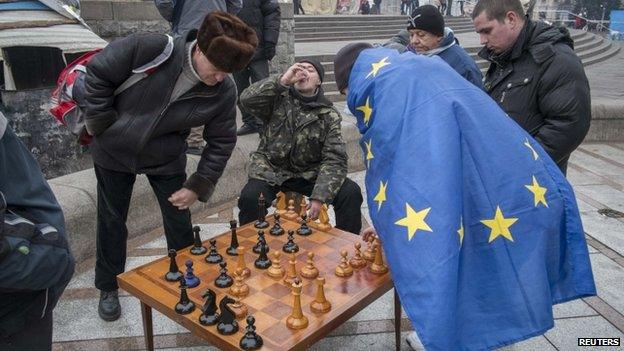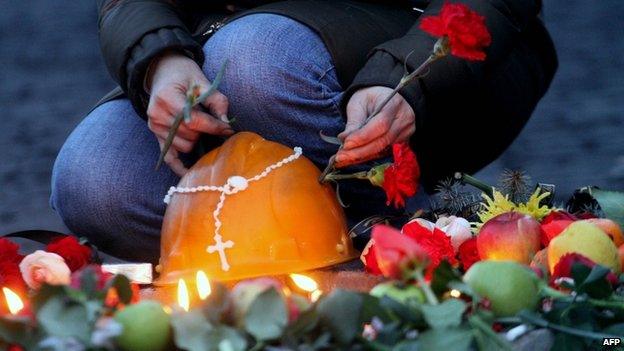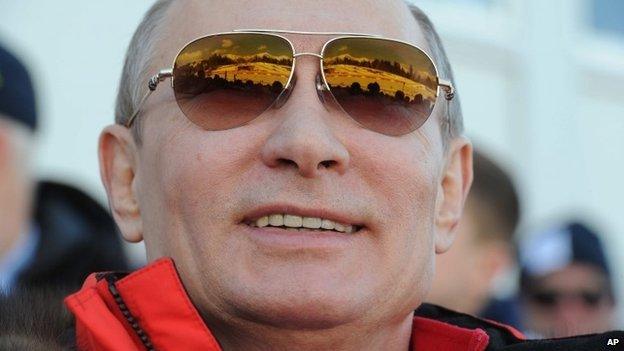Ukraine crisis: Why Russia and EU both stand to lose
- Published

As Russia and the EU ponder their next moves, these protesters play chess in Kiev's Independence Square
Ukraine is not a square of a Cold War chessboard. President Barack Obama has told us so, external.
The mantra in official Washington is that this crisis is not a zero sum game - Russia doesn't have to see itself as the loser in a power struggle.
The trouble is it does, it will, and that, sadly, ensures more problems in the future.
Ukraine, seen by some as the birthplace of Russian Orthodoxy, external, has been pulled between East and West for centuries: First subsumed into Europe, then buried beneath Russia, occasionally emerging as an independent nation in charge of its own direction and destiny.
This is what those bullets and Molotov cocktails are all about. Ukrainian-born Ariel Cohen, external of the Heritage Foundation told me this is a battle for an important country's European future.
"It is a big country, 15% larger than France," he said.
"It produces, inter-continental ballistic missiles, space launchers, some of the largest transport aircraft, bigger than jumbo jets. It has highly educated workers and probably the best agricultural land in Europe.
"It could be on a par with the economies of France and Germany eventually, but clearly it is corrupt, mismanaged and underdeveloped today."
Kremlin's pet project
Ukraine may be a prize, but the West is hesitant about wooing it too hard, even when people are prepared to die on the streets for the possibility of closer ties with Europe.

Dozens of people have died on the streets of the Ukrainian capital, mostly in the past few days
It's perhaps ironic that the EU is more alluring to those outside its borders than to existing members of the club.
The reassuring, soothing mantra in Washington is that this not a winner-takes-all zero sum game. But if for President Obama it is not chess, for President Vladimir Putin this does seem pretty black and white.
No-one is going to take one of his key pieces without a struggle - he wants Ukraine inside his pet project, the Eurasian Union, Russia's answer to the EU.
Dr Donald Jensen, external, a former political officer in the US embassy in Moscow who now works at the Center for Transatlantic Relations, says a lot is at stake.
"If you don't have Ukraine in the tent, Putin's Eurasian project is really just Moscow and a bunch of central Asian dictators," he explains.
"You need Ukraine in the mix, and you cannot have Ukraine wandering off to the European Union - an EU on the border with Russia in such a large significant way is ultimately a threat to the Putin regime itself.
"If Ukraine has a pluralistic democracy, if Ukraine has a free market democracy what does that say about the Kremlin? They are scared."
US fear of trouble
While President Obama, may not be as keen on the reset with Russia as before, he doesn't appear to want to scare them any more.
Ariel Cohen says: "My Ukrainian friends would bitterly complain about Obama's leadership. I would say we need more US leadership and much better coordination with our European allies.
"Together, the United States and Europe are a market of $34 trillion and close to 800 million people - we can provide aid and open our markets to Ukrainian industry in a way that Russia could not possibly match."
But Donald Jensen says that's not happening.

Russian President Vladimir Putin has promised Ukraine a $15bn (£9.2bn; 10.9bn euros) loan
"The White House does not appear to me to want to push Russian too far," he noted.
"The White House has other issues in which they are genuinely interested in engaging Moscow, Syria, Iran, trade, They don't want to push Putin too far and the events on the ground have forced them to go further than they originally wanted to."
If democracy triumphs, in a sense the West has won. It probably means that a European future is inevitable. It also may seem to many that this conflict matters less for the West.
Prof Charles Kupchan from the Council on Foreign Relations highlights what it would mean.
"Let's assume when the dust settles Ukraine enters some kind of Eurasian union and deepens its economic and cultural ties to Russia - will that threaten western security? No. Would it be a setback? Yes.
"It would in the sense that one of the aims of the United States and Europe has been to push eastwards markets, democracy, rule of law. That goal would be blocked if not scuttled."
With Obama determined not to appear to be dictating to the rest of the world, and with a European Union undermined by economic woes and self-doubt, there may not be the will to stand up in the next crisis.
Expansion, greed for new territory and conquests can be a very ugly thing.
But if the European Union is half-hearted about wanting new adherents for its cause, then that is as serious for the West as the Ukrainian crisis is for Putin's vision of a new Russian-led union.